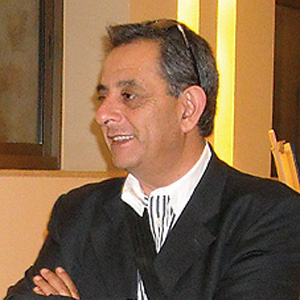The Diary of Elias Haddad
Born in 1896, Elias As’ad Haddad grew up in Nazareth, the city of his birth. He was a bright kid who knew what he wanted in life. Elias was popular among his friends (and hence nicknamed Abu Ali), ambitious, and musically talented, playing the oud. Upon finishing high school, he received a scholarship to go to Istanbul to study law. Unfortunately, after contracting a case of typhoid with prolonged high fever that almost cost him his life, his mother was too scared of losing him to allow him to travel to Ottoman Turkey. Disappointed, he embarked on a career that led him to the police force. Elias served his prime years under the British Mandate to eventually become chief superintendent (endowed with a crown and two stars). When the British government left Palestine, it awarded two “Exemplary” awards, one of them to Elias Haddad in honor of his service.
Abu Ali (since Elias indeed named his firstborn Ali) was a bookworm, as Im Ali would describe her husband. He also kept a diary, noting content that ranged from the serial numbers of his Pirelli Aerflex car tires to poems, quotations, words of wisdom, and, of course, newspaper clippings. As Dr. Qleibo states in his article on Aref al-Aref, “Diaries and journals were a prominent feature of daily life among the Jerusalemite [and other] Ottoman Arab bourgeoisie [and middle class] at the turn of the nineteenth century and during much of the twentieth century.” One entry reads, “Poverty is the father of crime and revolution,” citing Aristotle. Another entry quotes a piece of advice from Omar Ibn al-Khattab, the second caliph of the Rashidun Caliphate and a senior companion of the Prophet Muhammad. The Caliph admonishes parents not to expect their children to behave in ways similar to the previous generation since they’ve been born into different times! Politics, of course, occupies a prominent place in the diary. For instance, it lists the countries that voted in favor of the 1947 UN Partition Plan, along with those who abstained and those who voted against it. An interesting entry entitled “From the Jewish Talmud” is there as well, along with an explosive 1782 quote from Benjamin Franklin that carries a quite racist overtone concerning Jews.
During his service with the British police force, Elias never abandoned his dream to become a lawyer. Working and raising four children, he could only find time to take night courses, but he eventually did become a lawyer, and in the 1950s opened a law office in Bethlehem. My point is that pre-1948 Palestine was not a land without a people. There were lots of decent Elias Haddads who loved this land and served it in the best way they knew. The fact that Palestine was lost does not in any way diminish the stature and achievements of people like Elias Haddad, my grandfather.


